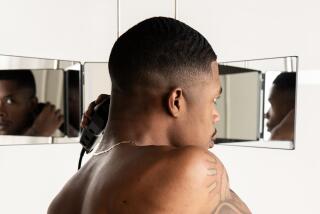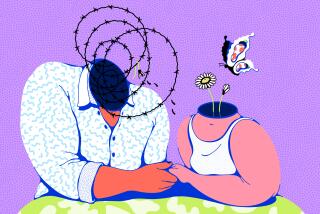Styling It Her Way
Iâve always been especially sensitive to my students who march to the beat of different drummers: the one with blond and black hair in a tomahawk, the one with silver rings in both nose and lip, the one who wears dreads.
There were many times I rushed to the defense of these students, reminding others that differences must be respected and a personâs looks or choice of body jewelry is not an opportunity for making hurtful remarks.
Recently I, a 50-year-young teacher, had a refresher course in knowing what it must feel like to be a teenager who dares to express himself or herself differently. I was criticized not by my peers, but by my steady date, who made those same sly remarks and digs that teenagers make--all because he could not fathom why I had chosen to wear my hair in a short natural.
Despite my explanations, he failed to understand.
âI work out at the gym, which makes it a waste of time and money to relax my hair,â I said.
âThis is the way I choose to wear my hair now,â I said.
âThis hairstyle is a symbol of my cultural pride,â I said.
He, a 52-year-old teenager, responded in a typical teenage fashion.
âWhy donât you grow some hair?â he asked.
âYour hair feels coarse,â he said.
âWhereâs your hat?â he asked.
For about two months, I vacillated between being perplexed by his behavior and trying to educate and reason with him. His comments made me feel fighting mad, sometimes disgust, anger and hurt.
I pondered why an African American man could not appreciate an African American woman who wears her hair in a natural style. Is that what being socialized in America had done to him, dictated what beauty standards he should admire?
Was he willing to pass up a classy, beautiful, professional lady because one aspect was not his ideal? Did he have to have a showpiece woman, with long, straight hair for his buddiesâ approval?
Ultimately, I did my emotional arithmetic and decided I was not receiving enough return on my investment. Time that should have been spent having fun and getting to know each other was foolishly wasted, because the âhairâ issue impacted and clouded so many other aspects of the dating ritual.
Foolishly or optimistically, I had tried to ignore one of the cardinal rules of human relations: There must first be acceptance. Without acceptance, there is no trust, and without trust, there is nothing.
Hair. The tyranny of hair. Natural or relaxed? Blonde or brunette? Long or short? Straight or curly? Weave or braids? So many choices, so much societal conditioning. With sadness and anger, I thought of the many anguish-filled conversations I overheard from my African American female students bemoaning the fact that young African American males choose only the girls with long, relaxed hair. What a sad reality for them to face, so early on, that one is judged on looks, not character or intellect or personality.
As for me, Iâve been ecstatic about the look and convenience of my short natural. Since my hair was a problem for him, not me, Iâve decided to âwash that man right out of my hair!â






